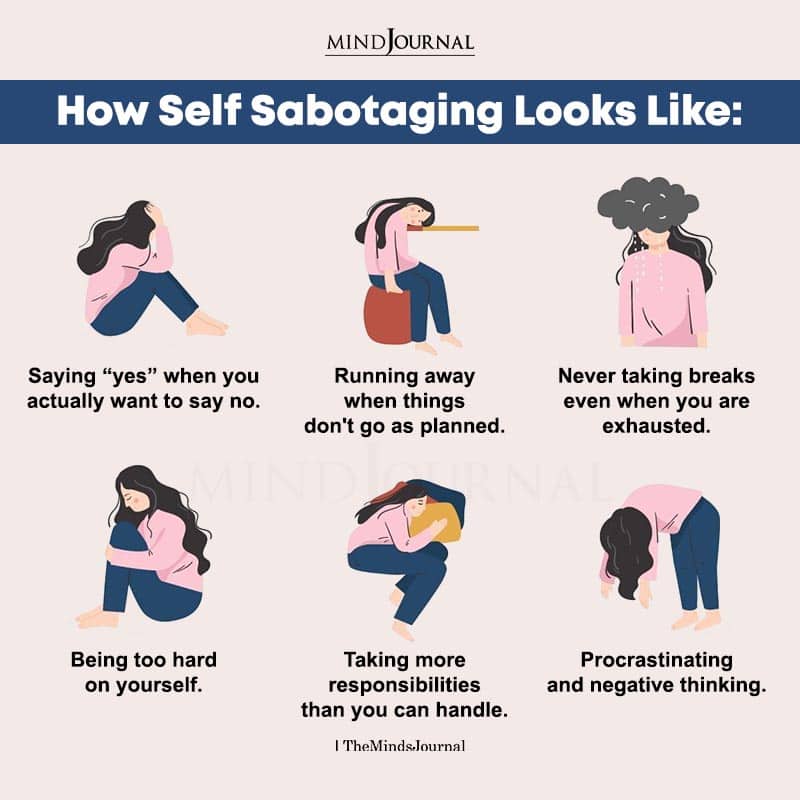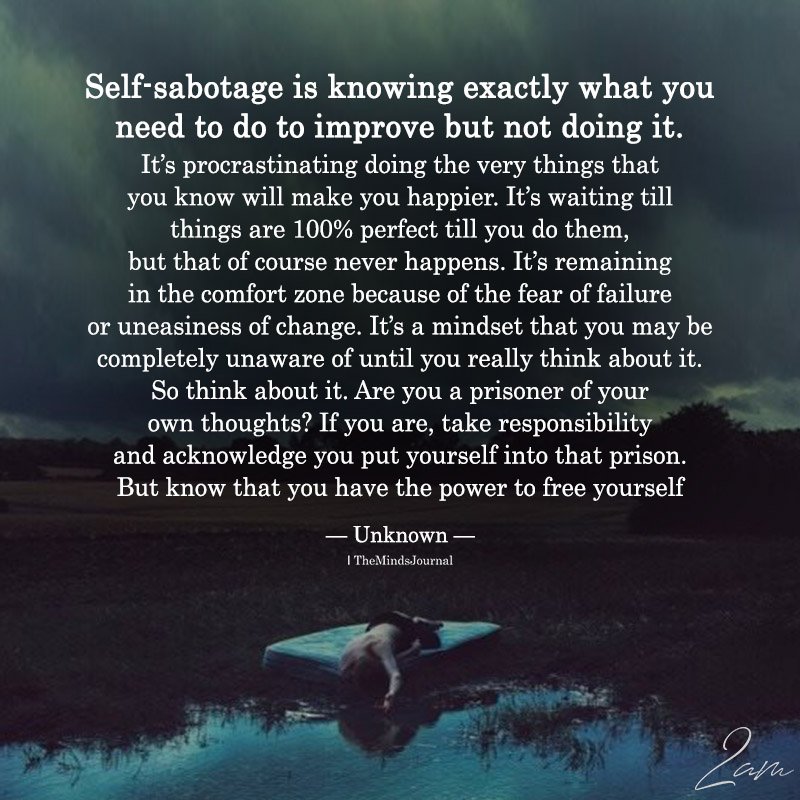Self-sabotage is all those thoughts that prevent us from achieving our hopes and dreams. Here are some tips on how to stop self sabotage and overcome your inner critic.
How what you negatively think hurts your life and what to do about it.
It’s commonly estimated that our brains have about 2,500 thoughts per hour, and 50,000 to 70,000 thoughts per day. As I explain in my new book, The Anxiety, Depression, & Anger Toolbox for Teens, many of these thoughts involve self-limiting beliefs. Examples of these self-defeating, harmful thoughts that manifest themselves across all ages include:
- “If I fail, then I’m a worthless, no-good loser.”
- “I should be a complete success in everything I do.”
- “In order to be a worthwhile human being, I need everyone’s approval.”
- “I can’t bear disapproval from those who really care for me.”
- “If I let my guard down and am vulnerable to another person, I will always get burned.”
- “I screw up everything in my life.”
- “If people knew about my past failures, they would not accept and respect me at all.”

Unfortunately, the more negatively we think about ourselves, the more our behaviors become negative ones, such as emotional eating, procrastinating, sabotaging relationships, avoiding reasonable challenges, and engaging in addictive behaviors. This negative acting out is compounded by the human brain, as psychologist Mark Hanson describes it, being like Velcro for negative experiences and Teflon for positive ones.
This means that we remember, and hold on to, the bad, upsetting experiences—many of which we create—more than the good things that have occurred in our lives.
Related: 6 Ways That Empaths Sabotage Their Relationships

The two most essential skills for living a healthy, happy life are calming down and problem-solving. Yes, being able to communicate, developing STEM skills, creative thinking, empathy, and assertiveness, to name a few others, are all important, too. But if you can’t calm yourself down and problem-solve, then life can very quickly become very difficult.
Related: How To Deal With Personal Insecurities In Your Marriage
Two Proven Ways: How to Stop Self Sabotage
We sabotage ourselves by a lack of calming down and problem-solving when our minds and actions are negatively influenced by harmful self-talk. Here are two ways to turn this around:
1. We Need To Calm Ourselves In Healthy Ways
A day filled with healthy self-soothing may include any of the following:
- Listening well to others around us. The more we truly listen to others, the less we realize the world is only about us.
- Having an attitude of gratitude. The more we appreciate what we have and “dwell in well,” the less we stew in regret over the past or anxiety about the future.
- Engaging in exercise. Exercise improves our mood, sleep, ability to concentrate, heart health, muscle tone, and lowers our risk for some forms of cancer.
- Listening to music. Music slows breathing, lowers heart rate, lowers blood pressure, quiets the nervous system, eases muscle tension, and reduces stress and anxiety.
2. We Have To Problem-Solve
Demands are inevitable in our life and that is why we need to always be ready when they pop up. Eleanor Roosevelt wrote that one’s philosophy is best expressed not in words but in the choices one makes. The choices we make are ultimately our responsibility.
Not being organized, failing to eat healthily, putting off things we need to do such as paying some bills, talking ourselves out of exercising, or not doing what is required for school, work, or what we promised others, are all examples of the poor day-to-day decisions that get in the way of feeling relaxed at night.
Related: 11 Signs Of Self-Pity And How To Overcome
Another way we let our negative beliefs influence us to fail to problem-solve is by not managing our family, intimate, social, and professional relationships (or maybe talking ourselves out of doing so). Here’s a news bulletin for all of us: The communication fairies will not pop up out of nowhere, fly over, and spray conflict-easing pixie dust on us and/or those in our lives. We must take action.
The same notion is true for problem-solving in our relationships. This means having healthy communication. Yes, it’s hard to do. Yes, you may feel, “Why should I have to be the one to clarify, be assertive, or apologize?” The answer is that the better you manage your relationships with others, the more positive you will feel about yourself.
In Conclusion
We have to overcome our brains’ bias for negativity. To conquer this, we learn to healthily calm ourselves down, productively problem-solve, and pay attention to the positive results. This really important step of paying attention helps you to prime your memories of these positive calming and problem-solving experiences and incorporate them into the wiring of your brain structure. Keep this up more and more and you will less and less often fall prey to self sabotage.
Related: 8 Ways We Sabotage Love In Our Relationships
Self-sabotage isn’t a personality trait; it’s a set of behaviors that keep you from reaching your goals. If you’re feeling stuck, be patient with yourself and reach out for help.
We hope that you learn about how to stop self sabotaging yourself and overcome negative behaviors that may bring you down. Share your thoughts with us in the comments below!
References - Bernstein, J. (2020). The Anxiety, Depression, & Anger Toolbox for Teens, Eau Claire, WI: PESI Publishing. Bernstein, J. (2015). 10 Days to a Less Defiant Child (2nd Ed.) Perseus Books, New York, NY. Bernstein J. (2009) Liking the Child You Love, Perseus Books, New York, NY. Bernstein, J. (2019). The Stress Survival Guide for Teens. Oakland, CA: New Harbinger Publications. Bernstein, J. (2017). Letting go of Anger—Card deck for teens. Eau Claire, WI: PESI Publishing. Bernstein, J. (2017). Mindfulness for Teen Worry: (Oakland, CA: New Harbinger Publications) Brainy Quote, Eleanor Rosevelt, https://www.brainyquote.com/quotes/eleanor_roosevelt_121041 Hansen, M. (2013) Hardwiring Happiness, https://www.youtube.com/watch?v=jpuDyGgIeh0
Written by: Jeffrey Bernstein Ph.D. Originally appeared on: Psychology Today Republished by:
Frequently Asked Questions (FAQs)
What causes self-sabotaging behavior?
Lack of self-esteem is one of the most common reasons behind self-sabotage. It leads to negative self-talk which promotes anxieties and self-destructive habits.
What are self destructive behaviors?
Self-defeating and harmful thoughts can be identified such as emotional eating, procrastinating, sabotaging relationships, avoiding reasonable challenges, and engaging in addictive behaviors.









Leave a Reply